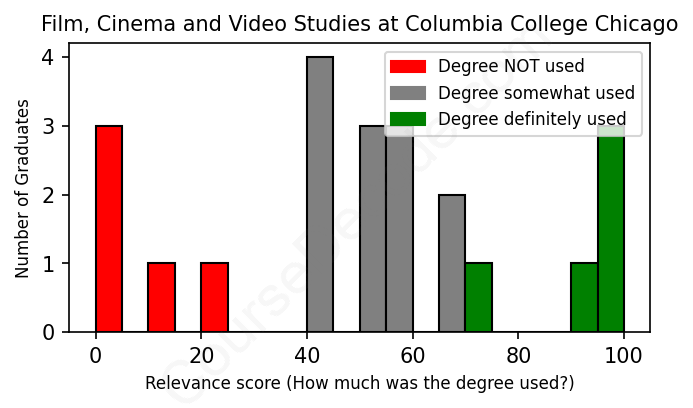
First, some facts. Of the Film, Cinema and Video Studies graduates from Columbia College Chicago we've analyzed , here's how many have used (or NOT used) their degree in their career:

These are estimates based on AI analysis of 22 LinkedIn profiles (see below).
The verdict? Significantly below average. Overall, with an average relevance score of 50%, Film, Cinema and Video Studies graduates from Columbia College Chicago have a much lower likelihood (-17%) of finding work in this field compared to the average graduate across all fields:
And for comparison, here's the chart for all profiles we've looked at across all degrees.
Also, after graduating, only 18% of these graduates have pursued further education other than another Bachelor's degree (such as a Masters degree or other), compared to the average across all profiles of 35%. This suggests a Bachelors degree is enough for most Film, Cinema and Video Studies graduates, and it's normal to look for work straight after graduation.
See the details:
|
Relevance score: 51% We think this person has gone into a career only somewhat relevant to their degree. We think this person has gone into a career only somewhat relevant to their degree.
DEGREE INFOGraduated in 2019 from Columbia College Chicago with a Bachelor's degree in Film, Cinema and Video Studies. No other secondary education since. JOB HISTORY SINCE GRADUATIONSubstitute Teacher Kokua Education Jan 2020 - Oct 2020 Book Seller  Barnes & Noble College Sep 2020 - Jan 2022 Retail Cashier  Kerasotes ShowPlace Theatres, LLC Oct 2021 - Jan 2022 Audio Video Technician  ACCELERATED SOLUTIONS, INC. Feb 2022 - Present ABOUTNo information provided. |
The top 10 most common jobs done by the graduates we've analyzed (ranked most common to least) are:
When looking at the career paths of Columbia College Chicago grads with a degree in Film, Cinema, and Video Studies, a variety of jobs pop up, but there are definitely some common trends. Many graduates find roles as production assistants, editors, and other hands-on positions in film and media, which align closely with what they learned during their studies. For instance, working as a video editor or a production coordinator directly ties into the skills taught in their degree program. Positions at organizations like the International Documentary Association show that some alums are also leveraging their film studies knowledge in educational and programming roles, which is super relevant.
However, there’s also a noticeable number of grads who ended up in roles that don’t really touch on their film background at all. Jobs in sales, logistics, or even as educators in unrelated fields highlight a disconnect between their degree and career. Some graduates are doing things like marketing or management, which can use some communication skills honed in film studies, but the specialty knowledge about cinema and video isn’t necessarily needed. Overall, while there are definitely paths that keep them in the film and media world, it's clear that not every grad sticks to what they studied, leading to a mix of relevance across their varied careers.
Here is a visual representation of the most common words in job titles for Film, Cinema and Video Studies graduates (this is across all Film, Cinema and Video Studies graduates we've analyzed, not just those who went to Columbia College Chicago):

Graduates of the Film, Cinema, and Video Studies program at Columbia College Chicago seem to follow varied career paths, with some finding success in the film and media industries, while others venture into unrelated fields. For many, their first job post-graduation typically involves entry-level positions like production assistant roles, internships, or even freelance gigs. This initial phase often helps them to build essential skills and connections in the industry. For instance, several alumni started as Production Assistants or in editing roles, which aligns well with their academic background.
However, looking at the career trajectories five to ten years down the line, the divergence becomes more pronounced. Some graduates have managed to carve out solid careers within the industry—working as editors, program coordinators at documentary organizations, or even adjunct professors in related fields. Others, unfortunately, have shifted away from their film roots, taking on roles in retail, sales, or even roles completely unrelated to film production. This suggests that while there are indeed success stories, a significant number may struggle to maintain a career directly linked to their degree. Overall, it seems like graduates of this program experience a mix of opportunities, with some thriving in the film world while others adapt to different career landscapes. It's definitely a mixed bag, but with passion and persistence, there's potential to create a satisfying career in the industry.
Honestly, a Bachelor’s degree in Film, Cinema, and Video Studies can be pretty challenging, but it mostly depends on how passionate you are about the subject. At Columbia College Chicago, you’re diving deep into not just the technical side of making films, but also the history, theory, and critique of cinema, which can be a lot to juggle. You’ll likely be working on hands-on projects, which is super fun but also time-consuming and requires a lot of creativity and collaboration. Some people might find it easier because they love storytelling and visuals, while others might struggle with the workload or the critiques that come with it. Overall, it’s not necessarily harder or easier than the average degree; it just really depends on your interests and dedication!
Most commonly, in the LinkedIn profiles we've looked at, it takes people 4 years to finish a Bachelor degree in Film, Cinema and Video Studies.
Looking at the career paths of these Columbia College Chicago graduates, it seems like they’ve had a mixed bag in terms of making decent money. Many of them started off with typical entry-level positions like production assistants or internships, which usually don’t pay a ton. However, as time went on, some managed to move into roles like editors, managers, or even adjunct professors, which typically offer better salaries. One thing to keep in mind is that the film industry can be pretty competitive, and not everyone will hit the jackpot right away—or ever. Those in more stable or corporate roles seem to be doing better financially, while others in freelance or more artistic positions might struggle a bit more, especially depending on the demand for their work. Overall, if you're into film, just be prepared for a rocky financial ride at first, but with determination, the money can get better later on!
Here is a visual representation of the most common words seen in the "about" section of LinkedIn profiles who have a Bachelor degree in Film, Cinema and Video Studies (this is across all Film, Cinema and Video Studies graduates we've analyzed, not just those who went to Columbia College Chicago). This may or may not be useful:

Here are all colleges offering a Bachelor degree in Film, Cinema and Video Studies (ordered by the average relevance score of their Film, Cinema and Video Studies graduates, best to worst) where we have analyzed at least 10 of their graduates:
| College | Score | Count |
|---|---|---|
 New York University New York University
|
73 | 17 |
 Full Sail University Full Sail University
|
57 | 34 |
 Georgia State University Georgia State University
|
56 | 15 |
 San Francisco State University San Francisco State University
|
51 | 21 |
 Columbia College Chicago Columbia College Chicago
|
50 | 22 |
 University of Central Florida University of Central Florida
|
48 | 10 |
 California State University, Fullerton California State University, Fullerton
|
47 | 11 |
 University of North Carolina at Wilmington University of North Carolina at Wilmington
|
31 | 10 |